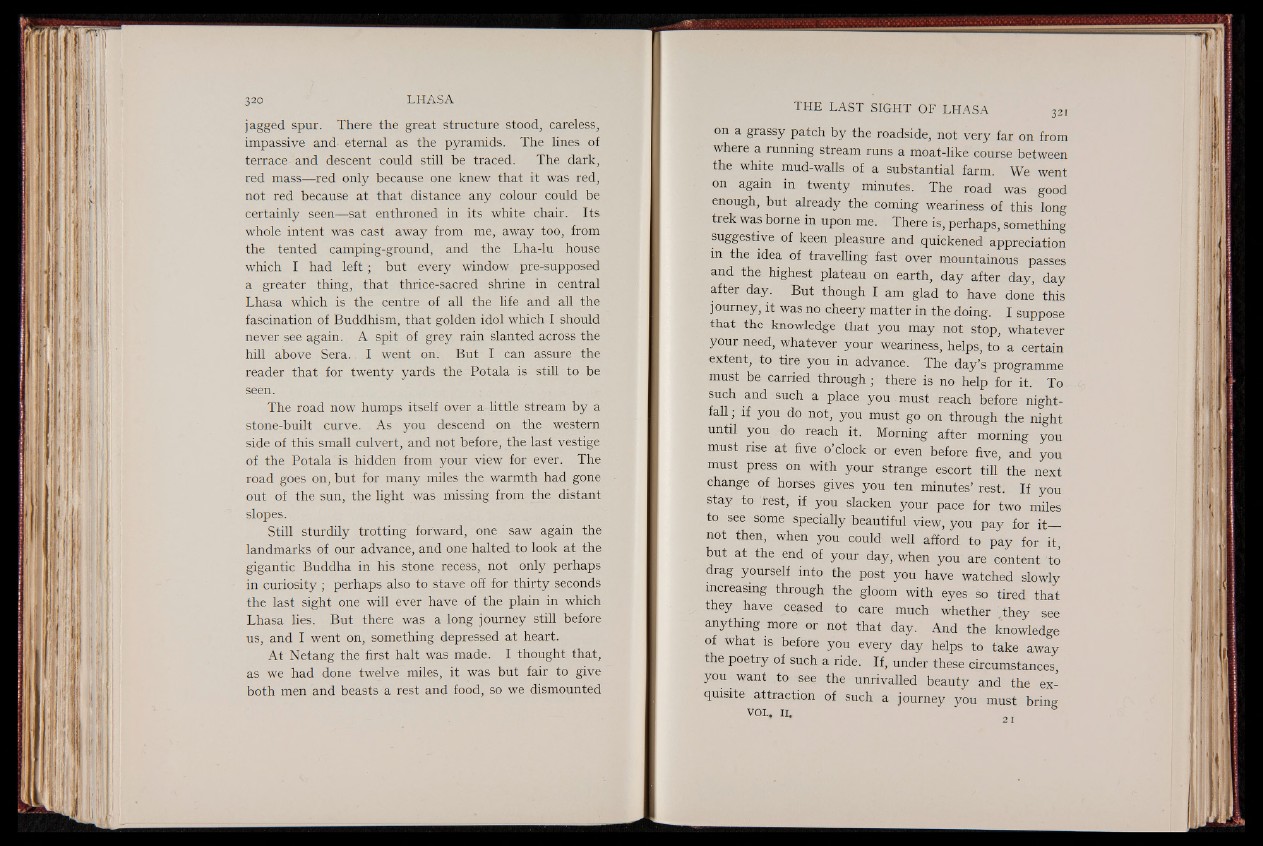
jagged spur. There the great structure stood, careless,
impassive and- eternal as the pyramids. The lines of
terrace and descent could still be traced. The dark,
red mass— red only because one knew that it was red,
not red because at that distance any colour could be
certainly seen— sat enthroned in its white chair. Its
whole intent was cast away from me, away too, from
the tented camping-ground, and the Lha-lu house
which I had le f t ; but every window pre-supposed
a greater thing, that thrice-sacred shrine in central
Lhasa which is the centre of all the life and all the
fascination of Buddhism, that golden idol which I should
never see again. A spit of grey rain slanted across the
hill above Sera. I went on. But I can assure the
reader that for twenty yards the Potala is still to be
seen.
The road now humps itself over a little stream by a
stone-built curve. As you descend on the western
side of this small culvert, and not before, the last vestige
of the Potala is hidden from your view for ever. The
road goes on, but for many miles the warmth had gone
out of the sun, the light was missing from the distant
slopes.
Still sturdily trotting forward, one saw again the
landmarks of our advance, and one halted to look at the
gigantic Buddha in his stone recess, not only perhaps
in curiosity ; perhaps also to stave off for thirty seconds
the last sight one will ever have of the plain in which
Lhasa lies. But there was a long journey still before
us, and I went on, something depressed at heart.
At Netang the first halt was made. I thought that,
as we had done twelve miles, it was but fair to give
both men and beasts a rest and food, so we dismounted
on a grassy patch by the roadside, not very far on from
where a running stream runs a moat-like course between
the white mud-walls of a substantial farm. We went
on again in twenty minutes. The road was good
enough, but already the coming weariness of this long
trek was borne in upon me. There is, perhaps, something
suggestive of keen pleasure and quickened appreciation
in the idea of travelling fast over mountainous passes
and the highest plateau on earth, day after day, day
after day. But though I am glad to have done this
journey, it was no cheery matter in the doing. I suppose
that the knowledge that you may not stop, whatever
your need, whatever your weariness, helps, to a certain
extent, to tire you in advance. The day’s programme
must be carried through ; there is no help for it. To
such and such a place you must reach before nightfall;
if you do not, you must go on through the night
until you do reach it. Morning after morning you
must rise at five o’clock or even before five, and you
must press on with your strange escort till the next
change of horses gives you ten minutes’ rest. If you
stay to rest, if you slacken your pace for two miles
to see some specially beautiful view, you pay for iW
not then, when you could well afford to pay for it,
but at the end of your day, when you are content to
drag yourself into the post you have watched slowly
increasing through the gloom with eyes so tired that
they have ceased to care much whether ,they see
anything more or not that day. And the knowledge
of what is before you every day helps to take away
the poetry of such a ride. If, under these circumstances,
you want to see the unrivalled beauty and the exquisite
attraction of such a journey you must bring